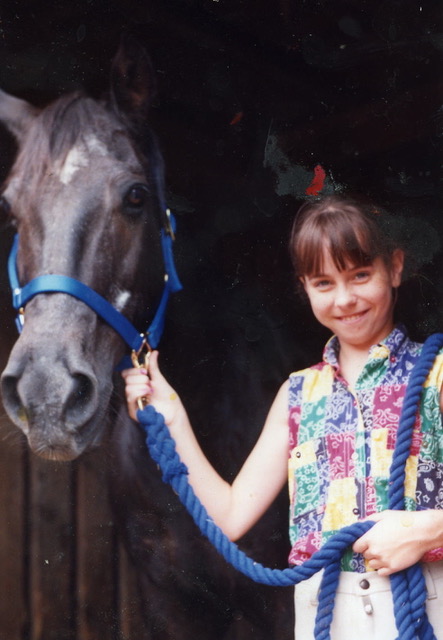
Posted by: The Sumaira Foundation in MOG, Proche-aidant.e, Voices of NMO

Your daughter is 11. Girls that young rarely get multiple sclerosis. They rarely suffer from optic neuritis. But those are the most logical explanations for her symptoms. The doctors decide not to treat the eye. They decide to wait. So you are relieved when your daughter’s vision slowly returns over a month. Until her other eye goes black…
Then you are filled with angst. What can you do? The doctors are perplexed. You are, too. But over time, the other eye resolves itself, and your daughter’s life goes on. She can even see pretty well, though she does have a hard time recognizing faces sometimes. And even today, she isn’t always sure what color lipstick to choose, as each eye sees colors differently.
 Riding horses in San Antonio provides an opportunity for fun, friends and a sense of normalcy.
Riding horses in San Antonio provides an opportunity for fun, friends and a sense of normalcy.
At 16, a driver’s license and the purchase of a fast Camaro force you to allow her to learn good judgement behind the wheel, while you fret like every other parent of a young driver.
In college, your daughter is diagnosed with multiple sclerosis. It’s a relief to have a diagnosis. But the treatments don’t help. You’re still confused. But your daughter is a warrior, and she carries on – riding horses, dancing, completing her college degree. She goes on to get married, complete law school and move with her husband to New York City. There, she has another flare. You go to New York to help out, to take her to, and visit her in the hospital. She gets lots of tests. And there, she is newly diagnosed with a strange and rare disorder – NMO.
You are relieved that you finally got a diagnosis that makes more sense, though the descriptions you read about the disease give you no comfort. She is your daughter; her vision keeps being compromised; you can’t help but worry, no matter how old she is.
So you read about and take your daughter to Guthy-Jackson patient days two years in a row, and you both learn a lot. To your dismay, you learn that there is much the professionals don’t yet know about this disease. You see that she is not alone. You discover that each patient experiences this disease differently, which isn’t any kind of solace. You worry about what might come next. You understand her concern that she may not be able to see things she dreams of –like the Pyramids of Egypt. And so, during a law school summer break, you take her there.

You are thrilled when your daughter is able to get pregnant. Neither of you were sure she could, with her diagnosis. You weren’t overly surprised when her twins were born early, and had to spend the first weeks of their lives in the NICU. You fear that this stress will cause another attack.
You are relieved when your daughter leaves her unhappy marriage. You pray that this stress does not cause another attack. You lean on your faith and family to move beyond this lengthy and difficult time.
As a parent, at least some part of you is always on the lookout for your child. You want to give her as much as you can. You don’t want to suffocate her. You want to make her difficult life easier. You don’t want her to become dependent. You want to support her in everything she chooses. You don’t want to enable her. Your parenting is a constantly changing balancing act.
When your daughter happily remarries, passes the Texas Bar Exam and finds a great job in her field, you are delighted. The balancing act may have changed, but it remains a balancing act nevertheless.
It’s been 30 years since David has struggled with his daughter’s illness. He has supported her in every way he knows how. He has educated himself about NMO/MOG, he has joined Facebook groups, he has spoken with other parents, he has attended conferences. And he’s been a dad like any other – he has taught her and guided her, been an example to her and doted on her. He has helped his daughter with time, money and love. He doesn’t regret any of it.
David’s loving daughter, Elizabeth, is an only child. She is his legacy. And he is rightfully proud.
As told to Gabriela Romanow on November 27, 2020